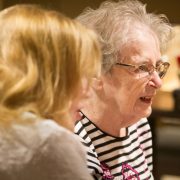The Importance of Proper Nutrition for Seniors in Alzheimer’s Care Facilities
Alzheimer’s disease still baffles a lot of medical experts. Although it has been studied far and wide, there still hasn’t been any cure for this debilitating disease and unfortunately, the number of people living with Alzheimer’s is increasing fast. But while there’s no cure, there are many ways to help people dealing with the condition, especially those in Alzheimer’s care facilities. One of the most important aspects of this type of care is proper nutrition.
Why Proper Nutrition Matters for Seniors in Alzheimer’s Care Facilities
Food is essential to the survival of humans. But more than that, food also helps to nurture the body and help patients with illnesses to fight their health conditions and recover to better health. However, for residents in Alzheimer’s care facilities, proper nutrition is extra important because:
Nutrition helps to delay the signs of Alzheimer’s.
- Several studies have proven that proper nutrition together with exercise and a lifestyle change can help delay the cognitive decline in patients with Alzheimer’s disease.
It helps to promote better overall health.
- Patients in Alzheimer’s care facilities need extra care every day, so they need all the help they can get in maintaining good health and well-being. Proper nutrition plays an important role in achieving this goal, so patients can avoid other complications or health risks that may make life harder for them.
It helps to reduce the risks of Alzheimer’s.
- Although there’s still no definite cause of why Alzheimer’s can occur in people, several studies have discovered that proper diet and using some supplements can help to decrease a person’s risk of developing one. Essential vitamins such as Vitamin B12, D, and E as well as folic acid are important in the diet if you want to reduce your risks of developing Alzheimer’s.
Nutrition Tips for Seniors in Alzheimer’s Care Facilities
Pack up on protein.
- Patients in Alzheimer’s care facilities should pack up on protein-rich foods such as lean meat, seafood, and dairy to keep their muscles strong and healthy.
Eat a well-balanced diet.
- Alzheimer’s care facilities create special meal plans for residents to make sure that they get enough nutrients from their meals every day. Seniors need to enjoy food from different food groups to not only help delay the signs of Alzheimer’s but also to protect them against other conditions such as heart disease, hypertension, and diabetes.
Drink plenty of water.
- Of course, hydration will always be an essential part of anyone’s diet and especially those in Alzheimer’s care facilities. Residents are encouraged to drink at least 6 to 8 cups of water daily and avoid sweet and processed beverages.
Alzheimer’s may not have a cure yet, but there are steps to reduce your risks of developing this condition and delay its progression. This is why residents need to eat well during their stay in Alzheimer’s care facilities to make sure that they’re getting the best nutrition. It helps them fight their disease and enjoy a better quality of life for a longer time.
Looking for excellent senior care in Nebraska? Click here to learn more about Fallbrook Assisted Living!
Fallbrook Assisted Living is proud to offer its services to Fremont, NE, and surrounding areas and cities: Arlington, Cedar Bluffs, Ames Nickerson, Fontanelle, Arlington, Leshara, Colon, and Hooper








